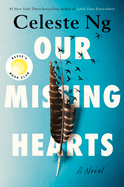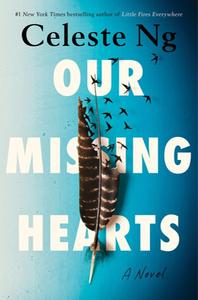
 Political and cultural division metastasize into a dystopian U.S. in which dissent is surveilled and heavily punished in Our Missing Hearts, an eerie, prophetic novel from Celeste Ng (Little Fires Everywhere).
Political and cultural division metastasize into a dystopian U.S. in which dissent is surveilled and heavily punished in Our Missing Hearts, an eerie, prophetic novel from Celeste Ng (Little Fires Everywhere).
Twelve-year-old Bird Gardner has struggled to make sense of the world since the disappearance of his mother, notorious revolutionary poet Margaret Miu, three years ago. He remembers overhearing the late-night talks that preceded her leaving, "first his father's voice, then his mother's, bracing itself, gritting its teeth." Now his father will tell anyone who asks only that they do not know or want to know where she is, and Bird is expected to agree. His friend Sadie claims Margaret is leading a movement to fight the federal act Preserving American Culture and Traditions (PACT), created as an antidote to a period of violent civic unrest known as "the Crisis." Under this legislation, the government is tearing families apart as children like Sadie are taken forever from parents the government believes to have "un-American" sentiments, most notably a refusal to agree that China is the root of all U.S. problems. Protest art featuring heart imagery and the phrase "our missing hearts," borrowed from a Margaret Miu poem, pops up across the nation and is just as quickly expunged.
Then Bird receives an envelope containing a drawing from a folktale his mother used to tell him. He believes she is contacting him and that the drawing might lead him to her. His ensuing quest leads him to missing children and renegade librarians, through a changed and sometimes dangerous New York City, and finally to the truth about PACT, his mother and what makes the risk of raising one's voice worth it.
Ng draws inspiration from the increase in hate crimes against Asian Americans, the Covid-19 pandemic, and the political and ideological rifts dividing the U.S., but her all-too-believable dystopian landscape could be the future of any country in which nationalism and xenophobia have run amok. This departure from the author's usual realm of domestic drama has an occasional glimmer of Margaret Atwood or Fahrenheit 451 but primarily showcases Ng's own ingenuity and range. Brilliantly envisioned and filled with Ng's signature tender, intimate character work and complex family dynamics, this coming-of-age story asks what it means to be a good parent or a good citizen when every child is at risk, as well as what power art has to challenge injustice. --Jaclyn Fulwood, blogger at Infinite Reads
Shelf Talker: This intimate, prophetic dystopian tale, a departure for Celeste Ng, both affirms and explores the power of family and art.

